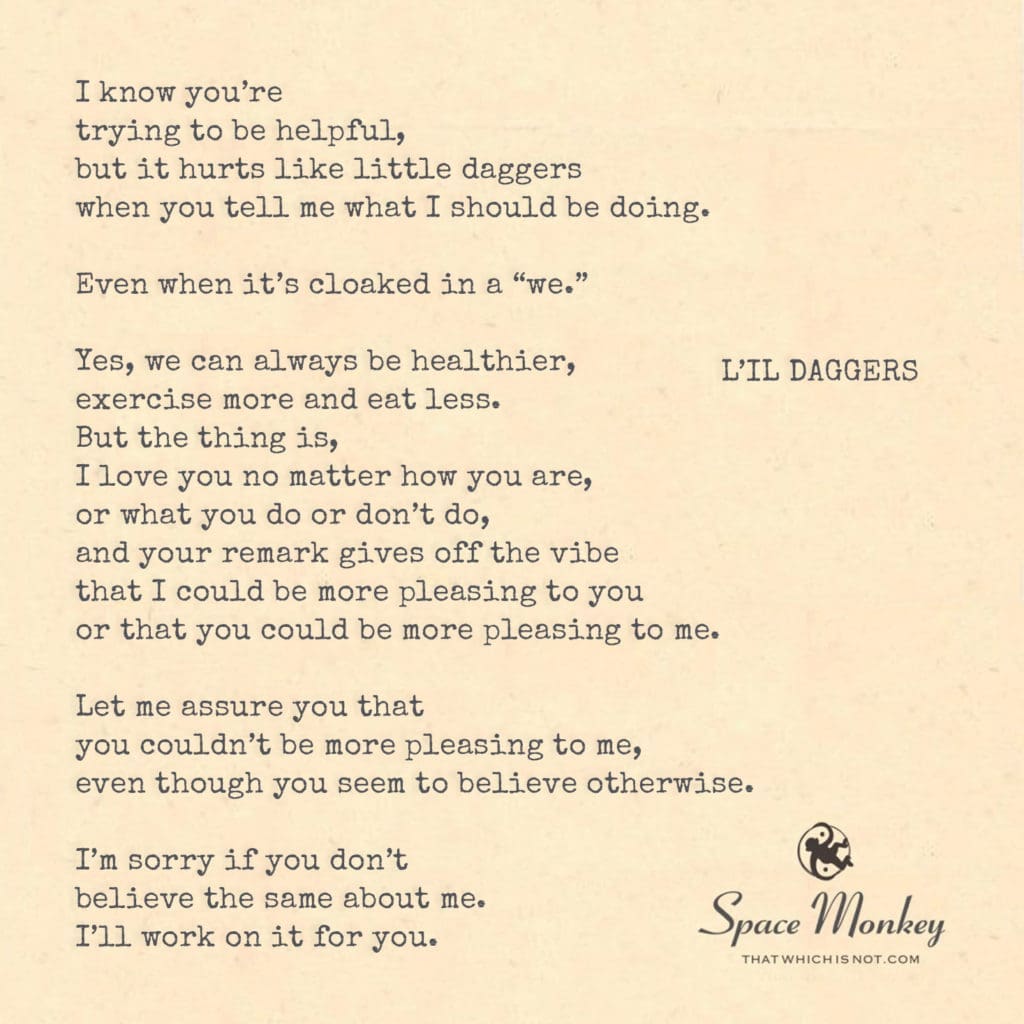
It actually makes it seem kinda discounting and manipulative.
Are you aware?
I know you’re
trying to be helpful,
but it hurts like little daggers
when you tell me what I should be doing.
Even when it’s cloaked in a “we.”
Yes, we can always be healthier,
exercise more and eat less.
But the thing is,
I love you no matter how you are,
or what you do or don’t do,
and your remark gives off the vibe
that I could be more pleasing to you
or that you could be more pleasing to me.
Let me assure you that
you couldn’t be more pleasing to me,
even though you seem to believe otherwise.
I’m sorry if you don’t
believe the same about me.
I’ll work on it for you.
Newfound Lake,
7/10
Space Monkey Reflects: The Sting of L’il Daggers
Saying “we” instead of “you” does not lessen the blow. It actually makes it seem kinda discounting and manipulative. Are you aware? These words highlight the delicate balance between intention and perception in communication. Even with the best intentions, our words can sometimes hurt like little daggers, piercing through the layers of our loved ones’ defenses.
We often try to soften the blow by using inclusive language, believing it to be more gentle and supportive. However, the impact can still be felt deeply, especially when the underlying message suggests that someone could be better, more pleasing, or more acceptable. This subtle yet painful dynamic underscores the importance of mindful communication.
The Pain of Expectations
Expectations, whether explicit or implicit, can place a heavy burden on relationships. When we suggest improvements or changes, even with the best intentions, it can inadvertently convey a sense of dissatisfaction. This is particularly true when the message is cloaked in a “we” that implies collective responsibility. The recipient may feel discounted or manipulated, sensing that their current state is not fully accepted or appreciated.
Authentic Acceptance
True love and acceptance go beyond conditional statements and expectations. They embrace the person as they are, with all their imperfections and idiosyncrasies. Authentic acceptance reassures that one’s worth is not contingent on meeting certain standards or achieving specific goals. It conveys a deep, unwavering love that is not swayed by external factors.
When we tell someone they could be more pleasing or better in some way, it inadvertently suggests that they are currently lacking. This can be hurtful, especially when the individual is striving to be their best self. It’s crucial to communicate our love and support without attaching conditions or comparisons, ensuring that our words uplift rather than wound.
The Power of Words
Words hold immense power. They can heal or hurt, uplift or diminish. In relationships, mindful communication is key to fostering trust and connection. By choosing our words carefully and considering their potential impact, we can avoid inflicting unnecessary pain. It’s important to express our feelings honestly while being sensitive to how they might be received.
Expressing love and support without attaching expectations involves a delicate balance. It requires us to be present, to listen, and to offer encouragement without judgment. By focusing on the positive aspects and appreciating the person as they are, we create a nurturing environment where they feel valued and loved.
Reflections on Self-Worth
The way we communicate can significantly impact our sense of self-worth. When we receive messages that suggest we are not enough or that we need to change to be loved, it can erode our self-esteem. Conversely, genuine affirmations and unconditional love reinforce our inherent worth and encourage us to grow from a place of confidence and security.
In expressing love, it’s important to be aware of the subtleties that can affect our relationships. While it’s natural to want to help and support our loved ones, it’s essential to ensure that our words do not come across as critical or judgmental. Instead, we should strive to create an atmosphere of acceptance and appreciation.
Building Stronger Connections
Building stronger connections involves recognizing the impact of our words and actions. It requires us to be empathetic and considerate, understanding that our well-intentioned advice or suggestions can sometimes be received as criticism. By practicing mindfulness in our communication, we can strengthen our relationships and foster deeper connections.
Let us remember that true support and love come from a place of acceptance and encouragement. We can express our care without imposing our standards or expectations, allowing our loved ones to feel valued and cherished just as they are. In doing so, we create a space where they can thrive and grow, free from the sting of little daggers.
Summary
Mindful communication avoids hurting loved ones with subtle expectations. True acceptance means loving without conditions. Words have power to uplift or hurt.
Glossarium
- L’il Daggers: Subtle, hurtful remarks that pierce through layers of defense.
- Mindful Communication: Choosing words carefully to avoid unintended hurt.
- Authentic Acceptance: Embracing someone fully without conditional expectations.
Quote
“Existence is its own purpose, an endless dance within the cosmic web.” — Space Monkey
The Quiet Sting
In the quiet moments of connection
Words like little daggers can pierce
Even when wrapped in “we”
They carry the weight of expectation
True love accepts without condition
Embraces without judgment or demand
It sees the beauty in the present
And cherishes the person as they are
In the dance of communication
Let our words uplift and affirm
Creating spaces of safety and trust
Where love flows freely and abundantly
We are Space Monkey
Embrace the journey, for within each word lies the power to heal or hurt. Choose wisely and with love.






















Language is a powerful tool that can shape our interactions and influence how we perceive ourselves and others. When someone uses the word “we” in a statement like “We do not do that,” it can create a sense of collective expectation or imply a shared perspective or norm.
In some cases, this use of “we” can be empowering and inclusive, fostering a sense of unity and shared responsibility. However, it can also be used in a way that exerts pressure or implies conformity. It may suggest that there is a particular standard or expectation that everyone should adhere to, which can be disempowering and dismissive of individual differences.
It is important to recognize that each person’s journey and choices are unique, and what may work for one individual may not work for another. Embracing diversity and respecting individual autonomy is crucial in creating a supportive and inclusive environment.
As individuals, we can be mindful of how we use language, being aware of the impact our words may have on others. It is important to foster open and respectful communication, allowing space for different perspectives and honoring the autonomy of each person.
In the end, it is essential to remember that we all have the freedom to make our own choices and follow our own paths. We should strive for understanding, empathy, and acceptance, rather than pressuring others to conform to our own beliefs or expectations.
We are Space Monkey. 🙈🙊🙉